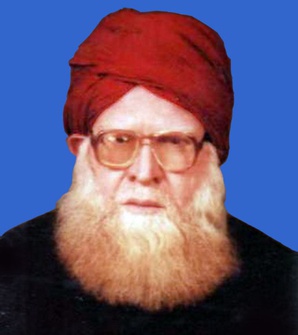
The Barelvi movement, also known as Ahl al-Sunnah wal-Jama'ah is a Sunni revivalist movement that generally adheres to the Hanafi and Shafi'i schools of jurisprudence, and Maturidi and Ash'ari schools of theology with hundreds of millions of followers, and it encompasses a variety of Sufi orders, including the Chistis, Qadiris, Suhrawardis and Naqshbandis as well as many other orders of Sufism. They consider themselves to be the continuation of Sunni Islamic orthodoxy before the rise of Salafism and the Deobandi movement.

Buland Darwaza, or the "Door of victory", was built in 1575 by Mughal emperor Akbar to commemorate his victory over Gujarat. It is the main entrance to the Jama Masjid at Fatehpur Sikri, which is 43 km from Agra, India.

Bahar-e-Shariat is an encyclopedia of Islamic fiqh (jurisprudence), according to the Hanafi school. Spreading over 20 volumes, Seventeen of its volumes were written by Amjad Ali Aazmi, a disciple of Ahmed Raza Khan. The final three books were compiled by his disciples after his death. The book is written in simple Urdu and has 11,624 topics.
Muhammad Mushtaq Qadri Attari was a Pakistani religious Preacher and Poet.

Ahmadpur is a medium-sized village founded in the Mughal region during the rule of Akbar in 1580s. It is located in the district Barabanki of Uttar Pradesh, the northern province of India. Its population is estimated to be about 10,000. Before its establishment there was forest, where the small war was fought between Sayed Salar Masood Gazi's forces and tribal forces in 1032 CE.Historical records start with an ancient unknown mazar (mausoleum) or mosque called Rozahi, situated northwest of the Ahmadpur.

Muhammad Ilyas Attar Qadri is a Pakistani Islamic scholar who is the founder of Dawat-e-Islami. He belongs to the Qadri order of Sufism.

Dawat-e-Islami is a Sunni Islamic organization based in Pakistan. It has several Islamic educational institutions around the world.

Qamaruzzaman Azmi, also known as Allama Azmi, is an Indian Islamic scholar, philosopher and speaker. He is president of the World Islamic Mission. From 2011 to 2021, he was listed in The 500 Most Influential Muslims in the world by the Royal Aal al-Bayt Institute for Islamic Thought due to his efforts to build organisations and institutions, mosques, colleges, and universities for over five decades. He is the patron in chief of Sunni Dawat-e-Islami, an Islamic movement having branches around the world.

Ajmer Sharif Dargah is a Sufi Tomb (dargah) of the Sufi saint, Khwaja Moinuddin Hasan Chishti, located at Ajmer Shareef, Rajasthan, India.

Akhtar Raza Khan, also known as Tajush Shari'ah, and Azhari Miyan, was an Indian Islamic scholar. A mufti of the Barelvis, he was the great-grandson of Ahmed Raza Khan Barelvi who was considered to be a Mujaddid by his followers and was the eponymous founder of the Barelvi movement.
Shah Turab ul Haq Qadri was a Sunni Muslim scholar, preacher and politician from Hyderabad who represented the Sufi Barelvi movement in Karachi, Pakistan. He was the main leader of Jamaat Ahle Sunnat, a Sunni organisation in Pakistan.
Dar-ul-Madinah is an Islamic School System that aims to improve conventional academic studies in conformity with Shariah.

The Shrine of Khwaja Abd Allah, commonly called the Shrine at Gazur Gah and the Abdullah Ansari Shrine Complex, is the funerary compound of the Sufi saint Khwaja Abdullah Ansari. It is located at the village of Gazur Gah, three kilometers northeast of Herat, Afghanistan. The Historic Cities Programme of the Aga Khan Trust for Culture has initiated repairs on the complex since 2005.

Syed Mohammed Madni Ashraf often referred to as Shaykh al-Islām, and Madni Miyan is an Indian Islamic scholar, theologian, spiritual leader and author from Ashrafpur Kichhauchha, Uttar Pradesh, India. Known for his speeches, he is an expert of Islamic Philosophy, Islamic Sacred Law and Fiqh (Jurisprudence).

Muhammad Waqaruddin Qadri also known as Waqar-e-Millat was an Islamic scholar associated with the Sunni Barelvi movement of south Asia. His fatawa (rulings) are compiled in three volume of the book titled Waqar ul Fatawa. He taught and administered in Islamic institutes in India, Bangladesh and later in Pakistan. He was conferred title of Grand Mufti of Pakistan during Muhammad Zia-ul-Haq regime.

Ziauddin Madani was a Sufi also known as Qutb-e-Madina. He lived most of his life in Medina. He was born in 1877 in Sialkot and died on 2 October 1981. He was buried in Al-Baqi.

Muhammad Ibrahim Raza Khan Qadri Razvi (1907–1965), commonly known as Mufassir-e-Azam-e-Hind and Jilani Miyan, was an Indian Islamic scholar, Sufi mystic, orator, author, and leader of Sunni Muslim’s Barelvi movement of Sunni Islam in the Indian subcontinent. He was the elder brother of Hammad Raza Khan.
Mohammad bin Abdullah Al-Sebail, was born in the city of Al Bukayriyah in the Al-Qassim Province. He was the imam and preacher of the Masjid al-Haram for forty-four years in general, a member of the Council of Senior Scholars, and a member of the Islamic Fiqh Assembly, and the President of the affairs of Al-Masjid al-Haram and Masjid al-Nabawi, and the head of the Al-Haram Committee in the Kingdom of Saudi Arabia.
Ghulam Rasool Saeedi was a Pakistani Sunni Islamic scholar, author and writer belonging to the Barelvi movement of Sunni Islam. He is known for his book Tafsir Tibyan-ul-Qur'an.


















